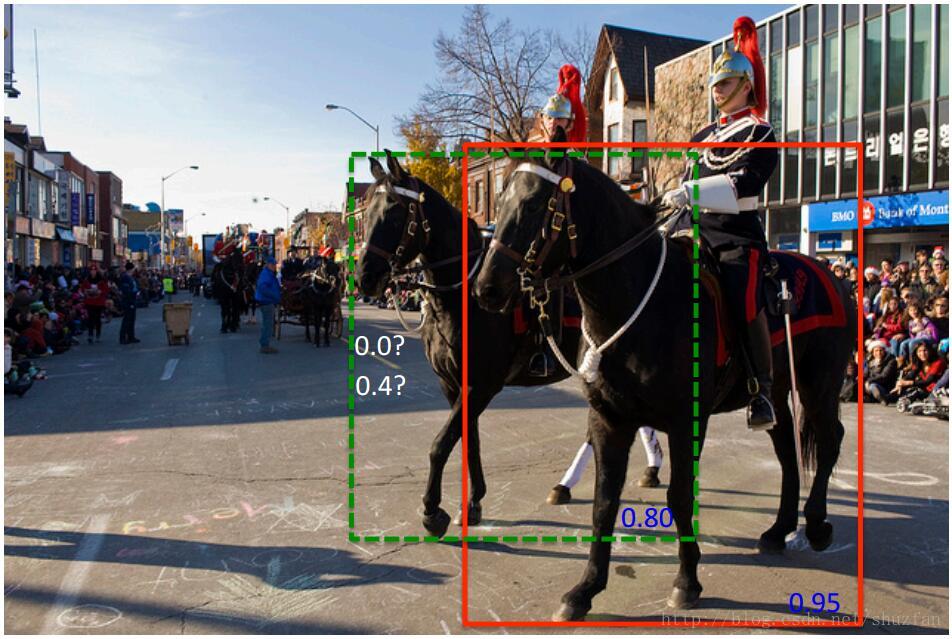Table of Contents
nms和soft-nms
nms
主要是将各个重叠的box清理,得到score最高的主要box,代码步骤实现:
- 将所有的box框根据score进行升序排列
- 判断box序列是否为空
- 保存当前的box序号
- 计算最高score与其余的box的iou
- 将iou大于阈值的box去除,得到余下的box序列
- 更新box序列
nms代码实现
1
2
3
4
5
6
7
8
9
10
11
12
13
14
15
16
17
18
19
20
21
22
23
24
25
26
27
28
29
30
31
32
#coding:utf-8
import numpy as np
def py_cpu_nms(dets, thre):
#输入:dets:为输入的box numpy原始序列:x1,y1,x2,y2,score
#输入:thre:iou阈值
xx1 = dets[:, 0]
yy1 = dets[:, 1]
xx2 = dets[:, 2]
yy2 = dets[:, 3]
scores = dets[:, 4]
#+1是因为默认顶点所在的轮廓边也为目标区域
areas = (xx2 - xx1 + 1) * (yy2 -yy1 + 1)
out = []
#按照score排序
order = scores.argsort()[::-1]
while len(order):
_index = order[0]
out.append(_index)
#计算index对应的box和剩余box的iou,进行筛选
_xx1 = np.maximum(xx1[_index], xx1[order[1:]])
_yy1 = np.maximum(yy1[_index], yy1[order[1:]])
_xx2 = np.minimum(xx2[_index], xx2[order[1:]])
_yy2 = np.minimum(yy2[_index], yy2[order[1:]])
_w = np.maximum(0, _xx2 - _xx1 + 1)
_h = np.maximum(0, _yy2 - _yy1 + 1)
_areas_inter = _w * _h
_overs = _areas_inter / (areas[_index] + areas[order[1:]] - _areas_inter)
#更新order,_inds:+1,因为len(_overs)+1=len(order)
#np.where(),只有condition的情况下,返回各维度的index tuple,这里只有一维:[0]
_inds = np.where(_overs <= thre)[0]
order = order[_inds + 1]
soft-nms
 传统的nms对于多个物体重叠的情况来说,会把低分的物体过滤掉,处理过于粗暴,参考上图;soft-nms的方法是将计算得到的iou和box本身的score的输入参数,重新计算box的置信度,最后根据新的置信度判断是否去除这个box,计算公式为:
传统的nms对于多个物体重叠的情况来说,会把低分的物体过滤掉,处理过于粗暴,参考上图;soft-nms的方法是将计算得到的iou和box本身的score的输入参数,重新计算box的置信度,最后根据新的置信度判断是否去除这个box,计算公式为:
线性加权: 
高斯加权:

代码实现步骤如下:
- 因为过程中需要对score进行更新,需要不能提前对box的score进行排序,需要遍历box,得到max_score的box序号:
- 得到最高score box序号,交换当前序号和最大score的box参数,包括score,box位置
- 遍历剩下的box与当前最高score的box进行iou的计算:
- 根据定义的更新规则(线性加权或者高斯加权)更新score
- 将score低于阈值的box交换到队列最后面,并更新队列数目,不再遍历这些box
- 更新序号,循环遍历
soft-nms代码实现
1
2
3
4
5
6
7
8
9
10
11
12
13
14
15
16
17
18
19
20
21
22
23
24
25
26
27
28
29
30
31
32
33
34
35
36
37
38
39
40
41
42
43
44
45
46
47
48
49
50
51
52
53
54
55
56
57
58
59
60
61
62
63
64
65
66
67
68
69
70
71
72
73
74
75
76
#coding:utf-8
import numpy as np
#coding:utf-8
#coding:utf-8
def soft-nms(dets, thre=0.001, Nt=0.1, sigma=0.5, method=1):
#输入:dets:为输入的box numpy原始序列
#thre:更新权重后score阈值,Nt为iou阈值,sigma为高斯权重的参数
#method,0:nms,1:线性权重;2:高斯权重
N = dets.shape[0]
for i in range(N):
#pos为与i比较的box序号
x1 = dets[i][0]
y1 = dets[i][1]
x2 = dets[i][2]
y2 = dets[i][3]
score = dets[i][4]
max_score = dets[i][4]
pos_tmp = i + 1
pos = i
#得到最大的score box序号
while (pos_tmp < N):
if max_score < dets[pos_tmp][4]:
max_score = dets[pos_tmp][4]
pos = pos_tmp
pos_tmp += 1
#swap pos and i index box
dets[i] = dets[pos]
dets[pos][0] = x1
dets[pos][1] = y1
dets[pos][2] = x2
dets[pos][3] = y2
dets[pos][4] = score
#更新max score box的参数
x1 = dets[i][0]
y1 = dets[i][1]
x2 = dets[i][2]
y2 = dets[i][3]
area = (x2 - x1 + 1) * (y2 - y1 + 1)
pos_tmp = i + 1
while (pos_tmp < N):
xt1 = dets[pos_tmp][0]
yt1 = dets[pos_tmp][1]
xt2 = dets[pos_tmp][2]
yt2 = dets[pos_tmp][3]
scoret = dets[pos_tmp][4]
areat = (xt2 - xt1 + 1) * (yt2 - yt1 + 1)
#计算iou
w = max(0, min(xt2, x2) - max(xt1, x1) + 1)
h = max(0, min(yt2, y2) - max(yt1, y1) + 1)
#if inter_area > 0
if w*h > 0:
iou = w*h / (area + areat - w*h)
if iou > Nt:
if method == 1:
weight = 1 - iou
else if method == 2:
weight = -np.exp(iou * iou / sigma)
else:
weight = 1
#更新score
dets[pos_tmp][4] *= weight
#如果score小于阈值,则将box扔到最后面废弃,pos_tmp-=1重新计算
if dets[pos_tmp][4] < thre:
dets[pos_tmp] = dets[N-1]
dets[N-1][0] = xt1
dets[N-1][1] = yt1
dets[N-1][2] = xt2
dets[N-1][3] = yt2
dets[N-1][4] = scoret
N = N - 1
pos_tmp -= 1
pos_tmp += 1
out = [_ for _ in N]
return out
论文参考:soft-nms论文